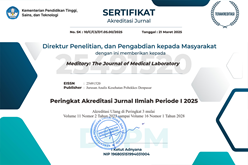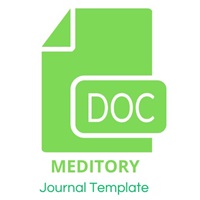HUBUNGAN KEPATUHAN DAN DUKUNGAN KELUARGA DENGAN CLINICAL OUTCOME PASIEN TB
DOI:
https://doi.org/10.33992/m.v10i1.1924Keywords:
Clinical outcome, family support, medication complianceAbstract
Background: Tuberculosis is an infectious disease caused by mycobacterium tuberculosis. The low compliance of tuberculosis treatment caused resistance and affected clinical outcomes.
Purpose: This study aimed to determine the relationship between medication compliance and family support with clinical outcomes in tuberculosis patients.
Method: This analytical study used a cross-sectional design. The population was tuberculosis patients who used intensive phase of tuberculosis treatment at several primary health care. This study used a consecutive sampling technique. After we met the criteria and the patient signed informed consent, then microscopic smear and measurement of body weight were done to find clinical outcomes. After that, we gave a Medication Adherence Report Scale (MARS-5) questionnaire to measure medication compliance and a family support questionnaire to measure family support. The collected data were analyzed by fisher-test.
Results: This study showed a relationship between medication compliance and clinical outcome with a p-value of 0.003 <0.05. Respondents with high adherence had 16.625 times the possibility of achieving clinical outcomes compared to respondents who had low compliance. In addition, it was also found that there was a relationship between family support with clinical outcomes with a p-value of 0.006 <0.05, and respondents with good family support had 11.333 times the possibility to achieve good clinical outcomes compared to respondents with sufficient family support.
Conclusion: Hight medication compliance on treatment and good family support is essential in achieving good clinical outcomes at the end of the intensive phase.
References
Kemenkes. Tuberkulosis - InfoDATIN 2018. 2018; Available from: http://www.depkes.go.id/folder/view/01/structure-publikasi-pusdatin-info-datin.html
World Health Organization. Global 2018 TB report. Vol. 69, WHO report. 2018. 683–690 p.
Kemenkes. Profil Kesehatan Tahun. Vol. 51, Kementerian Kesehatan Republik Indonesia. 2014. 1–268 p.
Kementerian Kesehatan Republik Indonesia Ditjen P2PL. Pedoman Nasional Pengendalian Tuberkulosis. 2014. p. 38.
WHO. Countdown to 2015 Global Tuberculosis Report 2013 Supplement report of Global TB Control. 2013.
Glick, I.D, Anya H. Stekoll dan SH. The Role of the Family and Improvement in Treatment Maintenance, Adherence, and Outcome for Schizophrenia. J Clin Psychopharmacol. 2011;31(1).
Ahsan, A. dan PASPH. Hubungan Dukungan Keluarga dengan Kepatuhan Minum Obat pada Pasien Hipertensi di Poli Jantung RSSA Malang. 2012.
Tommelein E, Mehuys E, Tongelen I Van, Brusselle G, Boussery K. Accuracy of the Medication Adherence Report Scale ( MARS-5 ) as a Quantitative Measure of Adherence to Inhalation Medication in Patients With COPD. Ann Pharmacother. 2014;48(5):589–95.
Gong X, Li Y, Wang J, Wu G, Mohemaiti A, Wushouer Q, et al. Treatment adherence among sputum smear-positive pulmonary tuberculosis patients in Xinjiang, China: A prospective study. RSC Adv. 2018;8(16):8983–9.
Ai X, Men K, Guo L, Zhang T, Zhao Y, Sun X, et al. Factors associated with low cure rate of tuberculosis in remote poor areas of Shaanxi Province, China: A case control study. BMC Public Health. 2010;10.
Shariff NM, Safian N. Diabetes mellitus and its influence on sputum smear positivity at the 2nd month of treatment among pulmonary tuberculosis patients in Kuala Lumpur, Malaysia: A case control study. Int J Mycobacteriology. 2015;4(4):323–9.
Thomas A, Gopi PG, Santha T, Chandrasekaran V, Subramani R, Selvakumar N, et al. Predictors of relapse among pulmonary tuberculosis patients treated in a DOTS programme in South India. Int J Tuberc Lung Dis. 2005;9(5):556–61.
Hadifah Z, Subronto YW, Ikhsan MR. Faktor Risiko Gagal Konversi BTA pada Pasien Tuberkulosis Paru Fase Intensif di Kota Yogyakarta. Bul Penelit Kesehat. 2019;47(2):83–8.
Tang Y, Zhao M, Wang Y, Gong Y, Yin X, Zhao A, et al. Non-adherence to anti-tuberculosis treatment among internal migrants with pulmonary tuberculosis in Shenzhen, China: A cross-sectional study. BMC Public Health. 2015;15(1):1–6.
Mustaming, Loriana R, Azhari, Badar. Improvement of family caregivers’ knowledge of polypharmacy in the elderly after health education. Pharmaciana. 2018;8(1):71.
Zhou C, Chu J, Liu J, Gai Tobe R, Gen H, Wang X, et al. Adherence to Tuberculosis Treatment among Migrant Pulmonary Tuberculosis Patients in Shandong, China: A Quantitative Survey Study. PLoS One. 2012;7(12):1–6.
Pitters TS, Kandou GD, Nelwan JE. Dukungan Keluarga Dalam Hubungannya Dengan Kepatuhan Minum Obat Pada Pasien Tuberculosis Paru Di Puskesmas Ranotana Weru. J KESMAS. 2018;7(5).
Septia A, Rahmalia S, Sabrian F. Hubungan Dukungan Keluarga Dengan Kepatuhan Minum Obat Pada Penderita TB Paru. Jom Psik. 2014;1(2).
Downloads
Published
Issue
Section
Citation Check
License
- Articles published in Meditory are licensed under a Creative Commons Attribution-ShareAlike 4.0 International license. You are free to copy, transform, or redistribute articles for any lawful purpose in any medium, provided you give appropriate credit to the original author(s) and Meditory, link to the license, indicate if changes were made, and redistribute any derivative work under the same license.
- Copyright on articles is retained by the respective author(s), without restrictions. A non-exclusive license is granted to Meditory to publish the article and identify itself as its original publisher, along with the commercial right to include the article in a hardcopy issue for sale to libraries and individuals.
- By publishing in Meditory, authors grant any third party the right to use their article to the extent provided by the Creative Commons Attribution-ShareAlike 4.0 International license.




